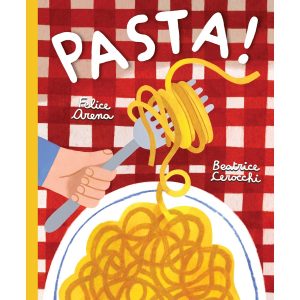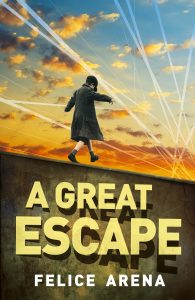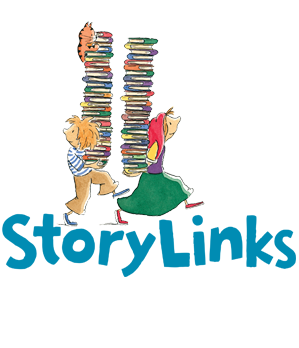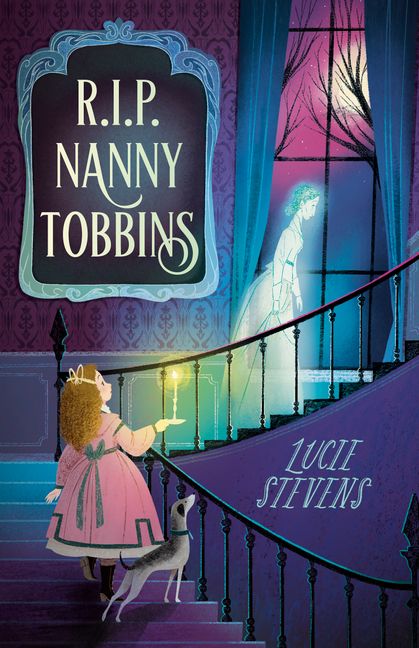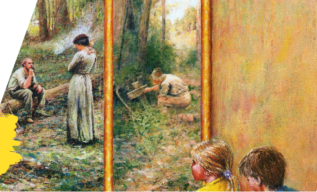
Meet Felice Arena: Book Links Award for Children’s Historical Fiction shortlist
By Mia Macrossan
There are four brilliant writers on this year’s shortlist:
Felice Arena : The Unstoppable Flying Flanagan, Katrina Nannestad : Waiting for the Storks; Pamela Rushby : Interned; Claire Saxby : The Wearing of the Green
Each one has kindly agreed to answer a few questions about writing historical fiction for StoryLinks.
Today we interview Felice Arena
 Felice is an actor, speaker, TV presenter and playwright and has written many award winning books including the Specky Magee series, the historical novels Fearless Frederic, The Boy and the Spy and A Great Escape, which was also shortlisted in the inaugural Book Links historical award. He also writes picture books, his latest is the totally delightful Pasta!, a rhyming celebration of Italian food.
Felice is an actor, speaker, TV presenter and playwright and has written many award winning books including the Specky Magee series, the historical novels Fearless Frederic, The Boy and the Spy and A Great Escape, which was also shortlisted in the inaugural Book Links historical award. He also writes picture books, his latest is the totally delightful Pasta!, a rhyming celebration of Italian food.
He very kindly agreed to answer some questions for us about The Unstoppable Flying Flanagan , even though a bit jetlagged from a trip to Ireland. We really appreciate the dedication, Felice.
Judges’ comments: In 1942 when Australia was facing major changes and women took up the jobs of men and began to stir up the pot that would lead to massive social changes and women’s movements, young Maggie has something to prove about girls and women in a man’s world. A carefully researched novel, full of heart and humour that fits naturally into its time period.
Why do you write historical novels?
I write historical fiction because I believe that we can discover more about ourselves through learning about those who came before us. Historical fiction can provide a portal to other times and a way to “experience” real-life past events that have shaped who we are today.
What was it about this particular time period that made you want to write about it?
While on a train ride from London to Edinburgh I read a newspaper article about women playing soccer during World War II. Soccer was a sport only played by men at that time. The article led me to wonder whether or not Australian women had also taken up a sport considered to be ‘just for the blokes’ during that same period. I was thinking of Aussie Rules Football. And sure enough, after doing some digging, I found out they had!
How do you ensure that your characters are ‘in period’ and not modern people transported into the past?
I’m a stickler for making sure that my characters are ‘in period’. It takes up the lion’s share of the research I do. I delve deep into photographs and film footage (if there is any) and zoom in on very small details. It’s the small details that will give you away, if you’re not careful. This is especially important the language and dialogue I give my characters. They can’t be using slang we use today, obviously. Language and catch-phrases shift and change with each generation. As a kid and teen growing up in the 80s, my friends and I would say ‘unreal ‘ or ‘rad’ for something we thought was cool. I know rad has slipped a little bit back into the vernacular today, but if I were to have Maggie from 1940s Melbourne call out ‘rad’, it would immediately take the reader out of that period. It would be very jarring. But it’s not only the language that I focus on. With my ‘historical detective spectacles’ on, I also take a closer look at the fashions, the hairstyles, food, buildings, means of transport, music and cultural events of the period in question. This is actually one of the most time-consuming parts of writing a historical novel, but I also find it deeply fascinating. Once you have the details pictured in your mind, it’s a wonderful feeling to create a story that rings true and honours the era you’re writing about.
While researching this book, what is something you learnt that particularly intrigued or surprised you? Did you learn anything that truly shocked you or were you already aware of much of the history?
I was surprised to learn that society accepted having women play footy as long as the games were presented as a way to raise money for the troops. But when women wanted to start up their own leagues after the men had returned from the war, they weren’t ‘allowed’ to do so. You’d think that the success of the charity matches (there were huge crowds in attendance) would have created some momentum for women in sport. But it wasn’t to be for quite a while. It was still very much a man’s world. Their work. Their games. Their rules.
I was also shocked to discovered that the Japanese had made a reconnaissance flight over Melbourne just a week after the bombing of Darwin. This startling fact was only made public after the war in the 50s. Even today most Australians wouldn’t know this. I used this little-known fact in the opening scenes of The Unstoppable Flying Flanagan. Maggie swears she had spotted the enemy flying over her backyard but none of her family or neighbours believe her.
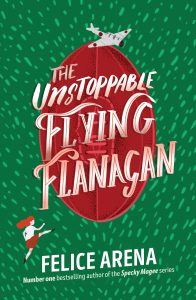 This story is very accessible due to its simple language, short chapters and being written in present tense, a familiar style for many young readers these days. Are these factors a conscious choice you make based on the story you are telling and the age group you are targeting, or is it more just the writing style that comes naturally to you?
This story is very accessible due to its simple language, short chapters and being written in present tense, a familiar style for many young readers these days. Are these factors a conscious choice you make based on the story you are telling and the age group you are targeting, or is it more just the writing style that comes naturally to you?
A little bit of both. This style does come naturally to me. But also, I want the reader to feel as if they have been dropped right in the story, and present tense does this. It makes it feel current and alive, very different from the style of most school textbooks from my generation. History is exciting if told the right way.
Your book is filled with defying gender stereotypes during the war, some are obvious such as girls can’t play football, drive vehicles, or race billycarts. Others are slightly more subtle, like the gender fluidity of Gerald and the female shopkeeper and her best friend living together. As Elena says: ‘I’d settle for being accepted as a person with all the same rights as you. I’d settle for not having to worry about being locked up one day for being myself…’ p126. Why was this important to add to an already very female empowered book?
I wanted to show that there is, or will always be, prejudice in our lives. But that prejudice is usually born out of lack of knowledge, or fear passed on by previous generations. In these characters you mention, yes, they don’t necessarily fit the ‘norm’ or the status quo, and are seen as outsiders, but it’s their quirky appealing personalities that I wanted to elevate in this book. It was my hope that readers would empathise with Gerald’s unwavering zest for life, Elena’s courage, and all the women’s spirited pursuit for equality.
You mention that at school you knew a nun that inspired Sister Clare’s character, was there also a nun that inspired Sister Gertrude and were you ever on the end of any punishments like Maggie?
Yes, there was a nun in my childhood who was the inspiration for the character of Sister Gertrude. And yes, I did get a ruler (not a cane) slapped across my backside once. I responded to the punishment by saying “Jesus would never do this!” which earned me another smack. But I have to say, the other nuns were superheroes in my school, and over all, I have lovely memories of them all.
Maggie is such a lively attractive and memorable character. What is your process for crafting characters that are all so different to each other?
I map out personality and physical traits for all of my characters, sometimes on paper, sometimes just in my head. I tend to exaggerate these traits in the workshopping of the story, then dial them back a tad when in the midst of actual writing. I also draw on people I know who share similar traits and use their personalities as a guide. But ultimately, and if you’re lucky, there’s a certain magic in writing where the characters in your book start to take on their own distinct personalities and ‘dictate’ how they want to be portrayed.
Your author’s note mentions that the character of Sister Clare was based on a nun called Sister Johanna at your primary school, and in 2018 she approached you at a writers’ festival. Can you tell us about the impression Sister Johanna left on you as a child? Does she know she has now inspired one of your characters?
Sister Johanna did not fit in the image of what one pictures when they think of a nun. She was so much fun – or at least she was in the eyes of an eight-year-old. She could kick a footy like no other person I knew. And watching her fly through the sky taking specky-tacular marks, well, she was our very own Flying Nun. She does not know she has inspired one of my characters. I do not have any contact details for her. So, if you are reading this, Sister Johanna, please get in touch. I have a signed copy of The Unstoppable Flying Flanagan set aside for you.
The book has strong messages of equality, human rights, community, feminism, racism, and how sport can bring people together. How do themes emerge in your stories? Do they arise naturally, or do you set out to highlight a particular issue?
Themes emerge through the characters themselves. I don’t set out with themes in mind. There’s a danger that the messages as would come across as too forced, contrived, and maybe even a little preachy. That’s not how I write. I write to entertain first, and if themes and morals bubble to the surface from there, they do so organically.
What are you working on now? Are there any topics you would love to write about but haven’t yet done so? Are you working on any more historical novels? If yes, can you tell us a bit about it?
I’m working on a couple of picture books slated to be published in the next year or two. As for another historical novel, I’ve just returned from visiting Ireland and there’s an idea swirling about that could emerge as my next historical adventure. For now, though, I’m just making space in my head for those ideas to keep percolating.
Thank you so much Felice for taking the time to answer our questions. It is always fascinating to find out more about a writer and their craft.
The winner of the Book Links 2023 Award for Children’s Historical Fiction will be announced at via zoom on 19th July. This is a free event and everyone is welcome to attend.
Details of the event are here on the Book Links website.
Find out more about Felice Arena and his books
